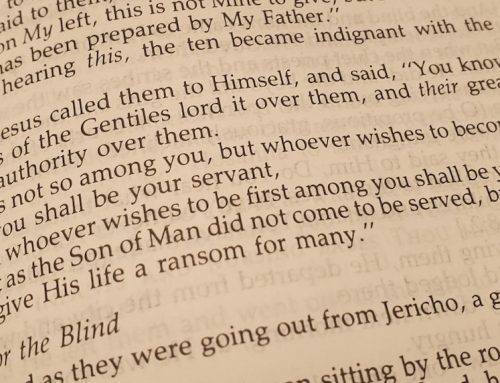Jesus: “Do not suppose that I have come to bring peace to the earth. I did not come to bring peace, but a sword. For I have come to turn a man against his father, a daughter against her mother, a daughter-in-law against her mother-in-law—a man’s enemies will be the members of his own household.” Matthew 10:34-36
Stanton: “See, our families are against us, so we must be on the right track.”
Inigo Montoya: “I do not think that means what you think it means.”
One of the grossest perversions of Jesus’s words by Stanton is its abuse of Jesus’s prediction that a man’s enemies would be the members of his own household. If you’re in the sect, you’ve probably heard this argument over the years; that because your family is opposed to your involvement in Stanton, and tries to get you out, that Stanton therefore must be teaching correctly—because Jesus’s prediction has come true.
Is your marriage falling apart because of the church? Not to worry. This is by Jesus’s design and totally to be expected. Do you have visitation of your child in the town you live in, but the church wants to send you elsewhere? Never fear, Stanton’s brilliant Bible scholars are here to rescue you from your responsibilities toward your child. You should abandon her as a “loyalty test,” of course. I mean, after all, Jesus did not come to bring families healing, but discord. Not peace, but conflict.
This twisted theology is one facet of Stanton’s treasured “martyr complex” or “victim mentality” that they try to project for themselves. The world is set against them, but because Jesus said that would happen, and that believers would face persecution from their own families, they justify very unloving and unnatural actions toward family relationships. It’s almost as if they feel the need to prove their faithfulness to the church by hurting their families.
But what if those passages don’t at all mean what Stanton thinks they mean? Perhaps those passages are troubling to you personally as well, because they don’t seem to fit with what you think you know about Jesus and God. Well, what do they mean, then?
I’m glad you asked.
First, let’s talk about the immediate context of these verses. Context is made up of WHO, WHAT, WHEN, WHERE, and WHY.
WHO: In Matthew 10, Jesus is clearly speaking to his twelve apostles:
Matthew 10:1 – Jesus called his twelve disciples to him and gave them authority to drive out impure spirits and to heal every disease and sickness.
In verse 2, he gives us the names of the people he was talking to…again, the Twelve. Not just any Joe Schmoe, not you, not me, but the Twelve.
He then continues his very specialized instruction to the Twelve:
Matthew 10:5-8 – These twelve Jesus sent out with the following instructions: “Do not go among the Gentiles or enter any town of the Samaritans. 6 Go rather to the lost sheep of Israel. 7 As you go, proclaim this message: ‘The kingdom of heaven has come near.’ 8 Heal the sick, raise the dead, cleanse those who have leprosy, drive out demons. Freely you have received; freely give.
OK, so now we know WHO is talking, WHO he is talking to, and WHO his apostles were being sent to (the lost sheep of Israel).
WHAT: I’ve alluded to WHAT Jesus is talking about, which is his sending of the Twelve out to preach. But let’s take some notes to make sure we don’t miss something important:
- The apostles were being sent to preach to the cities of Israel, and specifically NOT to the gentiles or Samaritans.
- They were being given miraculous gifts to help them with this task, including the ability to raise the dead, heal the sick, and cast out demons.
- They were not to take any food or money with them.
- They were not to worry about what they should say, because the Holy Spirit would give the the words to say when the moment came for them to speak. (Let’s be clear that the Holy Spirit was not going to give them a rough idea of what they could say—he was going to give them the actual words to say.)
- Jesus says they would be brought before councils and flogged in synagogues.
- When they were persecuted in one place, they were to flee to the next.
WHEN: It should be obvious that since Jesus is speaking to his Twelve Apostles, or chosen messengers, that this took place in the early part of the first century during Jesus’s ministry, which probably started in his early 30’s. This places the context during a very important time in Jewish and Biblical history.
There were many prophecies about this period of time that many Jews were aware of. For that reason, the more observant Jews were expecting the coming of the Messiah. In fact, Jesus is himself quoting one of those prophecies from Micah in the passage about bringing enmity to households:
Micah 7:6 – For a son dishonors his father, a daughter rises up against her mother, a daughter-in-law against her mother-in-law—a man’s enemies are the members of his own household.
So we have Jesus telling his apostles that the words of the prophets are coming to pass. You are being sent into the world to tell a “wicked and perverse nation” that the Messiah is here, only for Him to be rejected by that generation. And in the course of that rejection, clearly, families would experience enmity one against another. Some would even reject Jesus as the Messiah of prophecy altogether.
Before I move on, I want to point out that we’ve dialed this context down pretty specifically to a time that is very unlike our own. We are not preaching the gospel primarily to “the lost sheep of Israel” and avoiding gentiles. No, the house of Israel (as a nation, at least) rejected their Messiah, and so we now preach primarily to gentiles. It’s also important to note that Jesus didn’t tell his Twelve Apostles that the enmity within families would be due to someone rejecting the church’s authority. No, it would be due to someone rejecting Him, personally…Jesus the Christ, the anointed Son of God, the Messiah. Those who heard the preaching of the Twelve in the literal cities of Israel would largely reject Jesus, and persecute the apostles along with those who did actually choose to follow Jesus.
WHERE: I’ve already alluded to the fact that this scene takes place in the nation of Israel, since Jesus is specifically telling his listeners NOT to go anywhere BUT the cities of Israel. They were not to go into the cities of the Samaritans, or preach to the gentiles yet. This is a very important clue that Jesus did not intend for this instruction to apply to the church in all ages.
WHY: Lastly, we come to the question of WHY Jesus was telling the Twelve that his coming would bring discord and “the sword” to families. I think you can get the picture now. He’s steeling his messengers for the dangerous task ahead of them. They were the bearers of a message of Good News to those who would accept it. But through prophecy, it was well-known that few in that generation would accept it. The Jewish nation would come to reject their Messiah, and thereby reject his messengers, the apostles, as well as those who had chosen to follow him.
So the question remains, what can we learn from this passage, given the clear context it was written in? Will Christians today face persecution from their families, and from the culture they live in? I think anyone can look at the anti-Christian culture we live in and say yes to that—we will face persecution of a sort if we stand up for what we believe in. But by “persecution,” at least here in America, I mean we’ll have people dislike us, occasionally. There are very few instances of real persecution, like existed amongst first century believers, or like currently exists in some other countries (radical Muslim or communist countries, for example).
So yes, we can sort of encourage ourselves with these verses when someone dislikes us for our views on abortion, let’s say, or pornography, or our dislike for cursing like a sailor, or whatever. But if we remember to always speak truth in love, and never out of anger, hate, or retribution, even that “dislike” will be a rare thing. Plus, let’s face it, it’s kind of silly to pretend we’re being persecuted just because someone dislikes our opinion of something. If you want to know what real persecution is, you need to read up on the underground church. Generally, we have it pretty good in this country.
If we’re doing it right, following Jesus generally brings healing and peace to broken families—even when our families don’t agree with us on Jesus. I thank God for that, because that’s the way it should be.
Does it make any sense that a God of love, who created the family unit as the safest place to raise and train the next generation, would sabotage the family by intentionally bringing division and discord into it? I don’t think so, and I hope you don’t either.







The separation of an individual from their family is not unique to the SCOC. In Eric Hoffers book “The true believer” (1951) he explores this topic and cites the very scriptures you reference. For a leader to unite an individual to a group all other group allegiance must be dissolved. The military does this through its basic training, the separation and indoctrination of individuals from many different groups and backgrounds into one united group. I was told in boot camp: you are no longer one of them, your former groups are devalued as lazy or criminal or stupid, and you… Read more »
Instead of asking that the preacher who divided your family as a test of faith be willing to do the same, this article seeks to put a nail in the coffin of the idea that Jesus intends to divide our families in the first place. I think I explained pretty clearly the context of his words…the first century rejection of the Messiah by Israel, as prophesied. That said, yes, we can infer a secondary warning that each of us in 2022 should be willing to experience divided families for the cause of Christ. But what Stanton does with this is… Read more »
Different path but same result. If the leaders were to realize that they would be subject to the same judgements they put on others would they be so quick to place heavy burdens on their followers? Christ and his bride are a simple pattern of leader and followers. The pattern is to be one of partnership between the two but often is corrupted into master and slaves by evil leaders or grievous wolves as stated by the Apostle Paul. In the Bible there are both frequent promotions and frequent demotions. Christ humbly accepted both promotion and demotion as seen by… Read more »
Your going to keep a watch on me? Please do and feel free to correct me in the harshes way you know how for I have become enured to hardships. Paul the Apostle did not ask for financial support from carnal churches as this would hinder the spreading of the gospel and as a result some churches had it easier than others and got less reward in the afterlife because they suffered less and thus were worthy of lesser honor. Sin is ugly when it comes to fruition and God is not happy with those who go astray seeking an… Read more »
I consider it a false accusation to be told “They hate the church” and before this it was, “they are subverted”, before that it was “they are of a contrary spirit”, before that it was “they have no humility” all false accusations and character destruction. If I have sin then reprove my on my sin but how does one repent of a false accusations against one’s character? In truth it is just the opposite the church has hated many of us and abused and slandered us. It is time to call out leaders when they make such broad and vague… Read more »
Yes, it’s both a false accusation and evil surmising, to put it into Biblical language. We can’t judge motives, only actions.
Thank you. Slander is the primary tool used today and has been for years now. I was first slandered as “having no humility” not directly but it was told privately to others in the congregation when they asked why I was not asked to serve at the Lord’s table on Sunday’s. Then my children were slandered as being unclean when they were two years old and still in diapers and the same woman when baby sitting beat and bruised my daughter with a fiberglass rod. Now they slander me as hating the church? Please, they need to do a great… Read more »
There’s so much hurt in this, hurt people hurt people… but it doesn’t make anything better. I wish all of these people could see how clear this is to everyone who has finally left the brainwashing. Once you have left and deprogrammed yourself, you’ll find yourself and true peace within yourself.
Also most of how they operate is fear based, if you leave the cult, you won’t have anyone. Which is true because they made you cut ties with everyone else, and the cult members won’t have anything to do with you either. So instead of strengthening bonds with your family or other people, they want you to break those and know it will be hard to repair if even possible.
True.
Some of the hardest work you do is with your family: they know you best. As a result, Stanton cleaves to misunderstanding scripture because it allows them to omit the responsibility to their own homes and family. For example, it’s easier to purposely remain an enigma to my sect followers and point out their faults because they can’t point out yours: conversely, your family you avoid because they know who you truly are. Matt 10:34 is misapplied purposefully in my opinion: they are some of the smartest people I know. I am excused from my poor familial relationships because I’m… Read more »